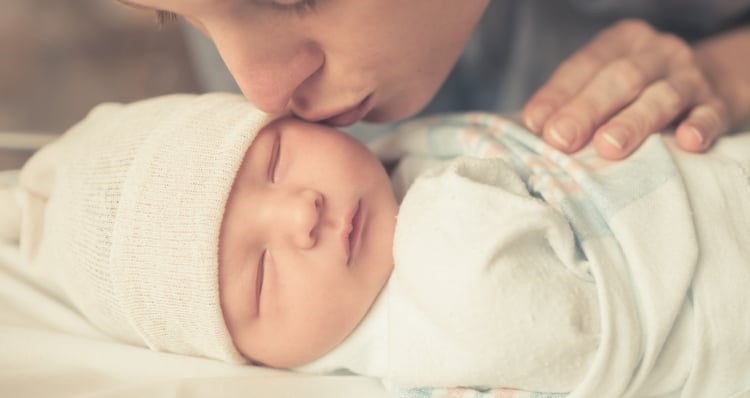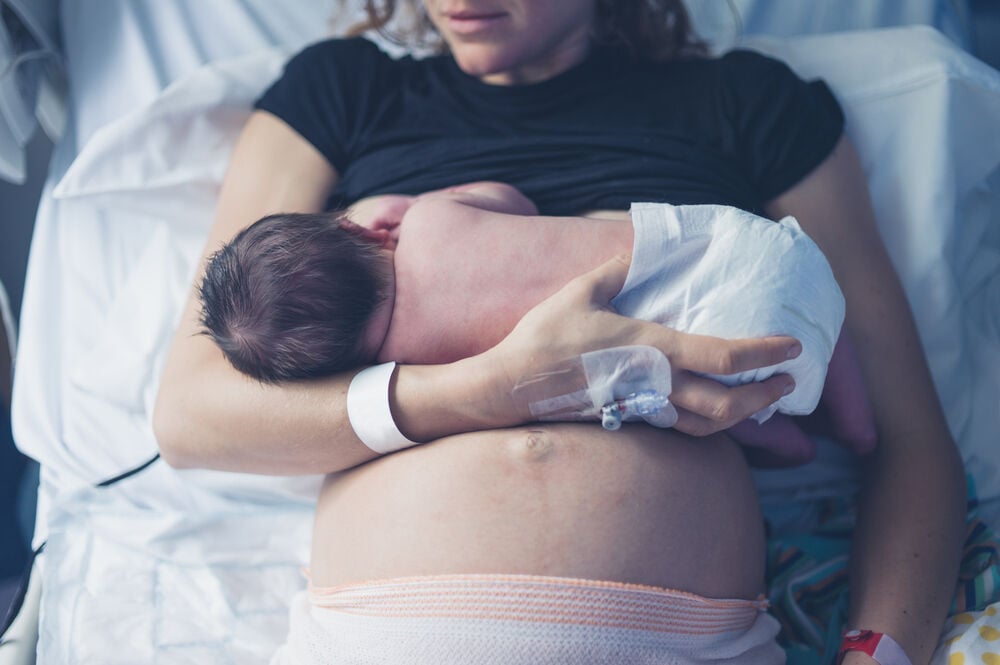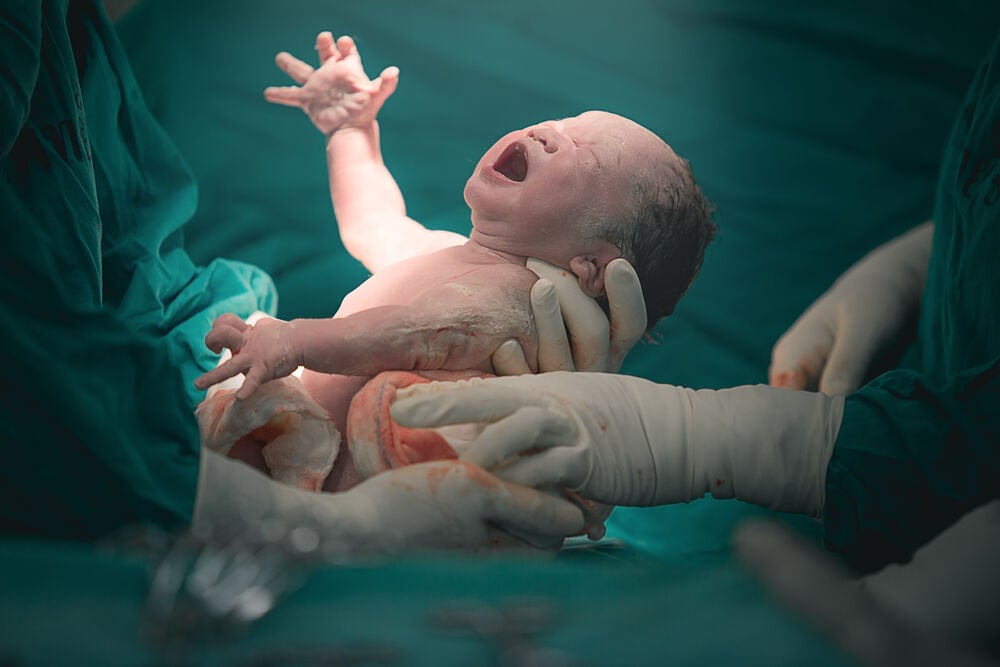How much do you know about your baby and newborns in general? Today, we switch on the "Newborns 101" mode and answer your most pressing questions about baby feelings, sleep, and many more.
-
Tracking cycle
-
Getting pregnant
-
Pregnancy
-
Help Center
-
Flo for Partners
-
Anonymous Mode
-
Flo app reviews
-
Flo Premium New
-
Secret Chats New
-
Symptom Checker New
-
Your cycle
-
Health 360°
-
Getting pregnant
-
Pregnancy
-
Being a mom
-
LGBTQ+
-
Quizzes
-
Ovulation calculator
-
hCG calculator
-
Pregnancy test calculator
-
Menstrual cycle calculator
-
Period calculator
-
Implantation calculator
-
Pregnancy weeks to months calculator
-
Pregnancy due date calculator
-
IVF and FET due date calculator
-
Due date calculator by ultrasound
-
Medical Affairs
-
Science & Research
-
Pass It On Project New
-
Privacy Portal
-
Press Center
-
Flo Accuracy
-
Careers
-
Contact Us
17 Curious Questions about Newborn Babies Every Parent Should Know Answers To


Every piece of content at Flo Health adheres to the highest editorial standards for language, style, and medical accuracy. To learn what we do to deliver the best health and lifestyle insights to you, check out our content review principles.
Are babies born pink, clean, and smooth?
The appearance of a newborn may be startling.
The baby’s cyanotic little body covered with a cheese-like substance, wrinkled skin, strangely shaped head, nose curled to the side or flattened, and folded ears — all that is the result of the baby staying in the womb for a long time and having a difficult journey through the birth canal.
Newborns recover quickly, though.
The cartilages straighten out, the head rounds out, and the skin becomes pink and velvety with elastic wrinkles.
Is it true that newborns should be taught to distinguish between day and night?
Babies are born with undefined sleep-wake patterns.
They need help to understand the time of day. In the daytime, there should be as much sunlight in the house as possible.
When the baby is active, play with him/her. Don’t try to mute the usual noises during the baby’s daytime nap.
Observe the bathing-feeding-sleeping ritual. At night, quietly change diapers and avoid bright lighting.
Babies usually adjust to the family schedule within 6–8 weeks.
Is baby vaccination dangerous?
In the first few days of life, newborns are subject to vaccination against diseases that pose a threat to their lives and health.
Some parents worry that the baby is too young to be vaccinated, but these fears are unfounded.
A newborn’s immune system is still immature, but it’s ready to develop an immune response to vaccine administration.
The resulting antibodies will protect the baby from serious infections in the future.
Are white spots on a newborn’s face a sign of a disease?
Milia look like small pimples with single or multiple whiteheads inside.
They can be found on the face and sometimes on the gums in 40–50% of newborns.
This is the result of sebaceous gland obstruction and is not considered a disease.
Don’t try to squeeze or clear up the milia as this may leave scars.
The milia will disappear in a few days or weeks when sebaceous gland function is normalized.
Take a quiz
Find out what you can do with our Health Assistant
Do baby hiccups mean they are freezing?
Hiccups are convulsive contractions of the diaphragm with the glottis closed.
They occur if a baby has overeaten, swallowed a lot of air, or drunk something cold.
Hiccups can also be caused by general hypothermia.
Hiccup fits usually last for 10–15 minutes and go away on their own.
They don’t trouble the baby, but you can latch the baby onto your breast or give the baby a pacifier to help regurgitate air.
If the hiccups happen too often, or last for a long time and exhaust the baby, or are accompanied by coughing or regurgitation, please consult a doctor.
Will shaving a baby’s first hair make it grow thicker?
A baby's hair is determined genetically.
Shaving the baby’s head will not make the hair grow thicker because cutting the hair doesn’t affect the hair follicles located in the dermis.
A temporary effect is achieved because the hair becomes the same length right after the haircut.
Can diapers cause infertility in boys?
Diapers contribute to scrotal temperature increase by 1,8 °F (1 °C).
Scientists suggest that this can affect sperm production when entering the reproductive age.
This is confirmed by a decline in male fertility due to low sperm count observed in recent decades.
However, no direct connection between infertility and wearing diapers in early childhood has been found yet.
Do babies sleep very deeply?
When falling asleep, a baby enters the rapid eye movement stage, or light sleep, and can sob, smile, tremble, or wake up from any careless noises.
Within 10–20 minutes, the baby enters the deep sleep stage, when they are particularly difficult to wake up.
The baby’s breathing slows down, and the muscles relax.
The sleep stages alternate, taking approximately equal amounts of time.

Can newborns recognize their mother’s smell?
Newborns have a well-developed sense of smell.
In the second week of life, a baby already knows the mother’s scent and calms down when smelling it.
Sometimes, it's enough to simply put the mother's clothes next to the baby.
Don’t use cosmetic products excessively.
Even if you’ve unintentionally skipped showering, your natural scent will be incredibly attractive to the baby.
Does the belly button shape depend on how the umbilical cord was tied at birth?
The belly button shape doesn’t depend on how the umbilical cord was tied.
Immediately after birth, the doctor applies a special clamp to the umbilical cord.
When the scar is formed, the stump will fall off painlessly.
The belly button shape depends on the scar formation, as well as the thickness of the skin and the amount of subcutaneous fat.
If crying helps develop a baby's lungs, should you comfort them immediately?
A newborn’s very first cry expands the lungs and opens the alveoli involved in gas exchange.
Later, crying helps strengthen diaphragmatic and intercostal muscles involved in breathing.
However, it doesn’t affect lung development. It increases neither their volume nor the number of alveoli.
Don’t leave your baby crying inconsolably for a long time.
Do babies scare themselves with their own hands in their sleep?
A baby throws its hands up in response to external stimuli. This is called the Moro or the startle reflex.
When doing so, the newborn spreads out the arms, opens the fists, and then goes back to the initial position.
The reflex can be caused by a loud sound, an abrupt movement of the parent holding the baby in their arms, a sudden touch, etc.
If the little one is sleeping, this will most likely wake them up.
Try to move the sleeping baby into the crib very carefully so that they don’t feel as if they're falling.
You can try swaddling your baby as this imitates the safety and comfort of the mother's womb.

Should the house always be perfectly clean once the baby is born?
Here's what will really help maintain your baby’s health:
- frequent hand washing
- sterilization of pacifiers and bottles
- cleaning the kitchen, toilet, and bathroom
- wet cleaning and aeration
- timely vaccination
Sanitizing door handles, toys, phones, keyboards, etc., is redundant.
If your baby’s hands feel cold, should you dress them in warmer clothes?
When your baby’s hands or feet feel cold, touch their back. If it is warm, the baby is not freezing.
Feel the baby’s forehead with your lips. It should feel cool, which means that the little one is not having a fever.
A newborn’s circulatory system is not perfect. All of its resources are primarily directed toward the vital organs.
It is enough to put socks or cotton gloves on your baby. The situation should normalize by the time they’re 3 months old.
Should baby clothes be ironed on both sides?
Washing clothes at high temperature doesn’t always guarantee getting rid of bacteria and viruses completely. In spite of it viruses may multiply and the growth of bacteria may continue.
These infectious agents can be easily transferred from one clothing piece to another in the washing machine.
Ironing kills pathogenic microorganisms that could linger on the laundry during washing or drying, and it also reduces the impact of the detergents left in the fabric on the baby’s skin.
It is enough to iron clothes on one side or steam them.
Should a baby always wear a hat, even at home?
There are no clear rules or guidelines on whether a newborn should be wearing a baby hat or cap at home.
But given that babies get overheated easily, there is no need for them to constantly wear a hat.
In addition, constantly wearing a hat at home prevents the mother from touching the baby’s scalp, which in turn is a powerful trigger for producing oxytocin, the tender affection hormone.
Do all babies smell nice?
Most people sniff involuntarily when holding a newborn.
The scent of a baby’s little fluffy head is so attractive that you want to inhale it again and again.
According to research, the smell of a newborn activates the mother’s brain areas responsible for pleasure.
Scientists believe it to be a special biological mechanism that helps a defenseless baby survive.


Hey, I'm Anique
I started using Flo app to track my period and ovulation because we wanted to have a baby.


The Flo app helped me learn about my body and spot ovulation signs during our conception journey.


I vividly
remember the day
that we switched
Flo into
Pregnancy Mode — it was
such a special
moment.
Real stories, real results
Learn how the Flo app became an amazing cheerleader for us on our conception journey.




